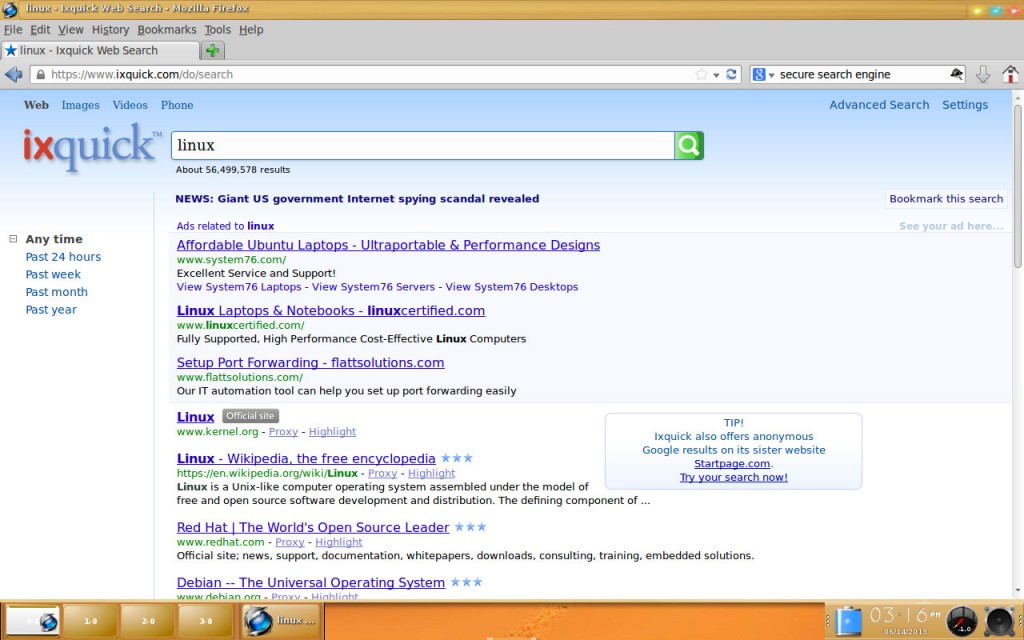If you’re a regular visitor to free software sites like FOSS Force, the recent revelations regarding the NSA and PRISM were probably not news to you. Probably most of us who are concerned about such luxuries as civil liberties understood from the first time we went online that we might as well assume we’re being watched and that there might one day be personal legal consequences, even if we never do anything illegal.
Posts published in “Internet”
Today I found this really cool FOSS site. I mean really cool. The people who run the site want to do things for the FOSS community. They’re looking for community involvement. They’re a bona fide nonprofit; they’re not looking to use their site to make their car payments or put their children through college. Their site isn’t cluttered with ads like, say, FOSS Force.
Christine Hall has been a journalist since 1971. In 2001, she began writing a weekly consumer computer column and started covering Linux and FOSS in 2002 after making the switch to GNU/Linux. Follow her on Twitter: @BrideOfLinux
According to a story posted by Phillip Molnar at the Monterey County Herald, the U.S. Army is blocking access to parts of The Guardian, the UK based news website which broke the story about the NSA’s surreptitious data collection programs. When the Herald’s story was first posted last night, it was unknown how widespread the outage was or who was behind it, only that employees at the Presidio of Monterey, California were unable to connect with certain pages of the UK website:
I don’t think there are very many people my age who’ve ever expected much in the way of privacy online.
Oh, maybe in the very early days some might’ve naively figured that if they didn’t actually interact with a site, like if they just went to the New York Times to read an article or something, they were pretty private, but they soon learned about tracking cookies and hackers with keystroke logging tools and right away understood that everything done online might possibly be being observed.
Christine Hall has been a journalist since 1971. In 2001, she began writing a weekly consumer computer column and started covering Linux and FOSS in 2002 after making the switch to GNU/Linux. Follow her on Twitter: @BrideOfLinux
Friday FOSS Week in Review
We may be paranoid but they are out to get us
In week three (or is it week four?) of the Spy vs. Spy scandal, the Obama folks keep saying things like “what’s the big deal?” while trying to convince us that the secret oversight court called FISA (we prefer “the Star Chamber”) has nothing but our constitutional rights in mind when it rubber stamps requests to secretly steal our privacy. Obama likes to talk about transparency. Indeed, he becomes more transparent by the moment; we’re beginning to see right through him. The 22nd amendment should now be seen as a face saver for Mr. Obama–as we would think no self respecting liberal or progressive would vote again for this man who once represented our best hope. Pity.
I first placed music online in 1996, a WAV file recorded through a microphone to promote the sale of an album I had under license on my indie BeanBag label featuring Georgie Fame and Van Morrison. I cheered for other music industry executives like Larry Rosen of GRP Records when he launched Music Boulevard online around 1997. I licensed songs by Jesse Colin Young (founder of The Youngbloods) to music publishing expert Bob Kohn’s eMusic.com for a cash advance against future royalties that had us partying like it was 1999.
Dave Bean is an Internet Radio pioneer who has worked for Musicmatch Internet Radio, baseBeat.com, OnRadio.com; and currently as a Music Curator for Internet Radio at Slacker.com. As an owner of independent record labels, he was one of the first to license songs to eMusic and iTunes.
Friday FOSS Week in Review
Looking at life through the prism of the NSA
We thought last week was the week for leaked government secrets on government spying. Nope. Last week was just the tip of the iceberg coming over the horizon, with the helmsman going into full reverse attempting to avoid a collision. This week the slow motion ship of state made contact with the iceberg. Damage assessment is being done now as we write these words.
While helping our colleague Dave Bean as he worked to get his essay on Google and the NSA ready for publication, I found myself wondering if any of this latest news on the government’s forcing their nose into everybody-in-the-world’s business would have any lasting effect. Sadly, I figured not–if there was any change, it’d only be temporary. I’ve spent too many years on this planet to expect too much in the way of permanent change for the better.
Christine Hall has been a journalist since 1971. In 2001, she began writing a weekly consumer computer column and started covering Linux and FOSS in 2002 after making the switch to GNU/Linux. Follow her on Twitter: @BrideOfLinux
One could argue that Google is a corporation whose content and cash flow results from their ability to survey the Internet with unfettered access to users’ information under protection of the Safe Harbor Provision of the DMCA. The provision is a corporate loop-hole that allows Google to not be held responsible for content that might otherwise be personal, private, or illegal as defined by the U.S. Constitution and The Geneva Accords. Google claims to be software without moral judgment and purposely refuses to admit that it may be facilitating mafia-style corporations counterfeiting without license and thus profiting through illegal gain by eradicating people’s property rights as otherwise guaranteed.
Dave Bean is an Internet Radio pioneer who has worked for Musicmatch Internet Radio, baseBeat.com, OnRadio.com; and currently as a Music Curator for Internet Radio at Slacker.com. As an owner of independent record labels, he was one of the first to license songs to eMusic and iTunes.






